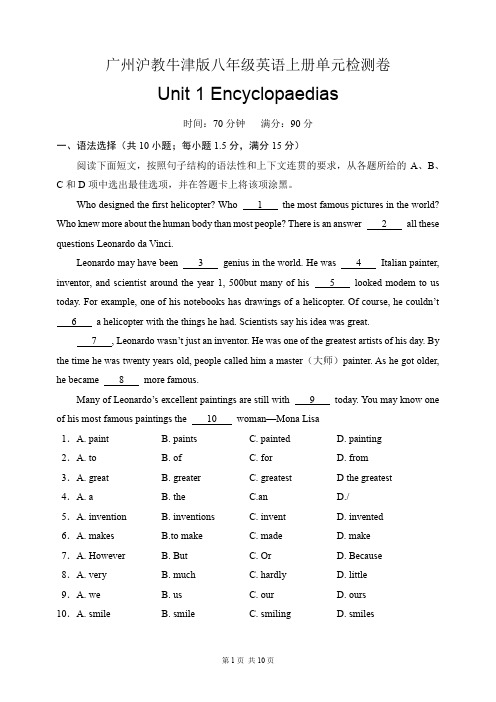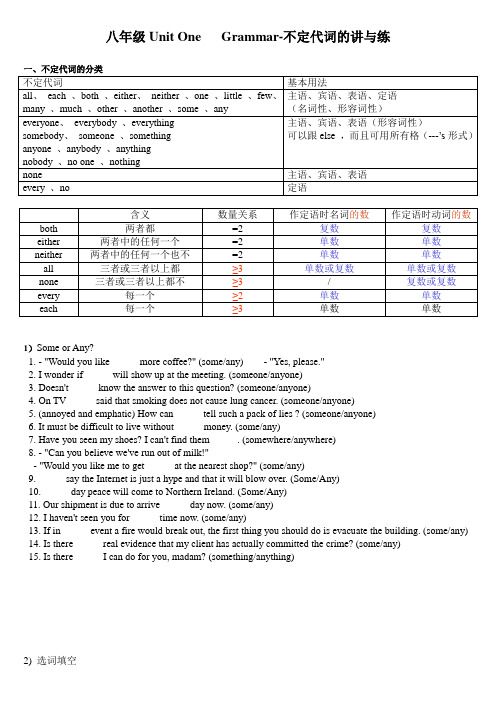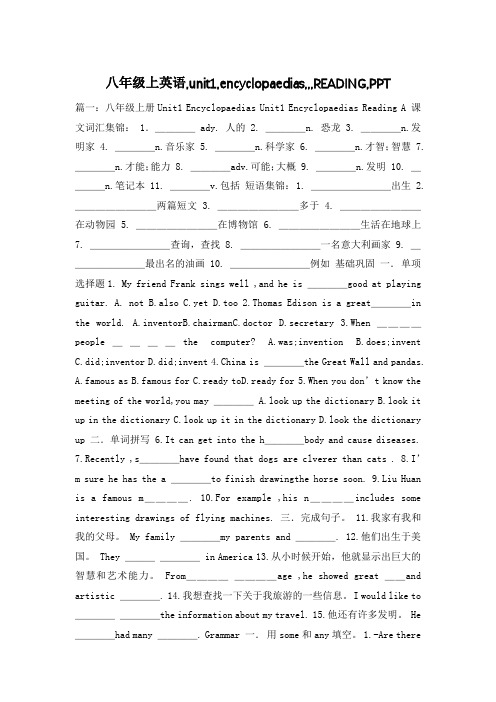广州2013版八年级英语上册Unit-1-Encyclopaedias-单元重点与练习题
广州沪教牛津版八年级英语上册 Unit 1 单元检测卷(含答案)

广州沪教牛津版八年级英语上册单元检测卷Unit 1 Encyclopaedias时间:70分钟满分:90分一、语法选择(共10小题;每小题1.5分,满分15分)阅读下面短文,按照句子结构的语法性和上下文连贯的要求,从各题所给的A、B、C和D项中选出最佳选项,并在答题卡上将该项涂黑。
Who designed the first helicopter? Who 1 the most famous pictures in the world? Who knew more about the human body than most people? There is an answer 2 all these questions Leonardo da Vinci.Leonardo may have been 3 genius in the world. He was 4 Italian painter, inventor, and scientist around the year 1, 500but many of his 5 looked modem to us today. For example, one of his notebooks has drawings of a helicopter. Of course, he couldn’t6 a helicopter with the things he had. Scientists say his idea was great.7 , Leonardo wasn’t just an inventor. He was one of the greatest artists of his day. By the time he was twenty years old, people called him a master(大师)painter. As he got older, he became 8 more famous.Many of Leonardo’s excellent paintings are still with 9 today. You may know one of his most famous paintings the 10 woman—Mona Lisa1.A. paint B. paints C. painted D. painting2.A. to B. of C. for D. from3.A. great B. greater C. greatest D the greatest4.A. a B. the C.an D./5.A. invention B. inventions C. invent D. invented6.A. makes B.to make C. made D. make7.A. However B. But C. Or D. Because8.A. very B. much C. hardly D. little9.A. we B. us C. our D. ours10.A. smile B. smile C. smiling D. smiles二、完形填空(共10小题;每小题1分,满分10分)阅读下面短文,掌握大意,然后从11~20各题所给的A、B、C和D项中选出最佳选项,并在答题卡上将该项涂黑。
2013新版八年级上Unit1SA-2课件

Did your sister go to the beach? 2. Q: (your sister/beach)_________________________________
A:: No, she didn’t. She stayed at home.
复合不定代词的Байду номын сангаас法
1.不定代词some, any, no, every与-one, -body, -thing构成复合代词。我们称之为复合不定代词
somebody 某人 someone 某人 something 某物,某事 nobody 没有人 no one 没有人 nothing 没有东西
anybody 任何人 anyone 任何人 Anything 任何事物 Everybody 每人 Everyone 每人 Everything 一切
2.Oh,did you go anywhere interesting? 哦,你去有趣的地方了吗? anywhere用作副词,意为“在任何地方”。 eg: Did you go anywhere during the summer vacation? 辨析:anywhere与somewhere anywhere意为“在任何地方”,常用于否定句和疑问 句中。eg: I can‟t find it anywhere. somewhere意为“在某处;到某处”,常用于肯定句
Did your parents visit museums?
What did your parents do? 5. Q:(your parents/museums)_____________________________
A: They visited a lot of museums. The museums were interesting.
【精品】八年级英语上册 Unit 1 Encyclopaedias grammar课件.ppt

We can form negative statements in two ways
There is not anybody in the room. There is nobody in the room.
Unit1 Encyclopaedias
Grammar
A. some and any
We use some and any to talk about amounts.
I have some questions about dinosaurs. She does not have any questions about dinosaurs. Do they have any questions about dinosaurs? Yes, they have some questions about dinosaurs.
8.Is there anyone next to the piano?
S1: Is there anyone next to the piano? S2: Yes, there's someone next to the piano.
milk noodles
Mum: Do we have any milk? Wendy: Yes,we have some milk. Mum: Do we have any noodles? Wendy: No, we don't have any noodles.
orange juice potatoes
Mum: Do we have any orange juice? Wendy: Yes,we have some orange juice. Mum: Do we have any potatoes? Wendy: No, we don't have any potatoes.
八年级上册 Unit 1 Encyclopaedias Grammar-不定代词

八年级Unit One Grammar-不定代词的讲与练一、不定代词的分类不定代词基本用法all、each 、both 、either、neither 、one 、little 、few、many 、much 、other 、another 、some 、any 主语、宾语、表语、定语(名词性、形容词性)everyone、everybody 、everything somebody、someone 、something anyone 、anybody 、anything nobody 、no one 、nothing 主语、宾语、表语(形容词性)可以跟else ,而且可用所有格(---’s形式)none 主语、宾语、表语every 、no 定语含义数量关系作定语时名词的数作定语时动词的数both 两者都=2 复数复数either 两者中的任何一个=2 单数单数neither 两者中的任何一个也不=2 单数单数all 三者或三者以上都≥3单数或复数单数或复数none 三者或三者以上都不≥3/ 复数或复数every 每一个≥2单数单数each 每一个≥3单数单数1)Some or Any?1. - "Would you like _____ more coffee?" (some/any) - "Yes, please."2. I wonder if _____ will show up at the meeting. (someone/anyone)3. Doesn't _____ know the answer to this question? (someone/anyone)4. On TV _____ said that smoking does not cause lung cancer. (someone/anyone)5. (annoyed and emphatic) How can _____ tell such a pack of lies ? (someone/anyone)6. It must be difficult to live without _____ money. (some/any)7. Have you seen my shoes? I can't find them _____. (somewhere/anywhere)8. - "Can you believe we've run out of milk!"- "Would you like me to get _____ at the nearest shop?" (some/any)9. _____ say the Internet is just a hype and that it will blow over. (Some/Any)10. _____ day peace will come to Northern Ireland. (Some/Any)11. Our shipment is due to arrive _____ day now. (some/any)12. I haven't seen you for _____ time now. (some/any)13. If in _____ event a fire would break out, the first thing you should do is evacuate the building. (some/any)14. Is there _____ real evidence that my client has actually committed the crime? (some/any)15. Is there _____ I can do for you, madam? (something/anything)2) 选词填空I was walking home from school. I was alone. ________(Somebody/Anybody/Nobody) was with me. It was very dark. Suddenly, there was a yellow light. ________(Something/Anything/Nothing) landed in front of me. It was a spaceship! ________(Somebody/Anybody/Nobody) spoke, but I didn’t understand him. I didn’t see ________(somebody/anybody/nobody). I was terrified(恐惧), so I ran back home. When I got home, I took off mu jacket. Then I saw ________(something/anything/nothing) strange on the back. It was a message! It said, “Meet us-same day, same time, same place, next week.”3)用下列单词填空anybody/anyone somebody/someone nobody/no one something nothing anything1.I’m thirsty! I’d like ________ to drink.2.We’re bored. There isn’t ________ interesting to do.3.John called his friend Jack, but he went out. ________ answered the phone.4.________ just rang the bell. I’ll answer the door,5.I noticed that ________ was missing as soon as I walked into my bedroom.6.How strange! There is ________in the street.7.Our teacher gave us ________ difficult to do for homework. It is a Maths problem.8.We should buy some food. There is ________ in the kitchen cupboards.9.We don’t have ________ to eat at home. Let’s go to a restaurant.10.Does ________ want to see a film with me tonight?4)其他不定代词用法(拓展)A.another, other, others, the other, the others1. I only found Jim and Tom there. Where are____?2.Of these three girls one comes from China and______two come from Japan.3.This sweater is a little too big for me. Can I try on(试穿)?4.Some like black tea,_____prefer(偏爱) green tea.5.I don’t like these colors. Show me some_____ , please.6.Have you any____books on this subject?7. Saying is one thing and doing is_______.8. It is always hard to tell the twins one from______.B.neither, none, either1.I know_____of the two students.3.He doesn’t agree with_____of his parents on many things.D.one, the one, ones, one’s1.These shirts are too small. I want to have some bigger______.2.Which boy is your son?—_____in a red cap.3._____has to do_____best.4.I have only one small flower on my desk and she has three big______.。
广州牛津八年级英语教案Unit 1 encyclopaedia

Unit 1 Encyclopaedias一、教材分析本单元围绕着“百科全书”的话题来展开听、说、读、写的训练。
教材介绍两篇来自百科全书的短文为载体,帮助学生了解百科全书的特点和用法。
作为初二年级的学生,了解和使用百科全书对于提高学生的自学能力有一定的帮助。
语法方面A部分数量词some和any为训练目标,。
B部分重点讲授不定代词somebody, anybody, nobody的用法,并培养学生在完成一篇有关baby dinosaur的短篇故事尝试正确使用这些词。
具体课型、课时安排如下:二、教学对象分析1.学生通过初一的学习,对工具书的使用有一定的了解,通过对百科全书的介绍和用法,提高学习的自学能力,有利于开展本单元的听、说、读、写任务。
2.学生在初一就已经接触过了some 和any 以及不定代词somebody, anybody, nobody的用法,本单元再通过系统地复习,在学习方式上引导学生学习归纳总结。
三、单元教学目标1.认知目标:2. 思想情感目标:1)通过谈论“交友”的相关话题,帮助学生快速适应新环境以及找到新朋友。
2)结合课文的内容,引导学生通过邮件的形式结交更多的笔友,拓展自己的视野。
3. 能力发展目标:1)能够在听、说、读、写等语言综合实践活动中运用本单元的重点词汇、句型与语法。
2)在学习中提高交流和传递信息的能力,在写作中正确运用连词使文章更连贯和流畅。
3)通过指导学生在模拟交际中运用所学的知识,培养学生探究学习、合作学习、自主学习的能力。
四、单元教学重点1. 学生熟练掌握重点词语,词组及句型。
2.指导学生利用所学句型正确表达思想、进行交际活动。
3.指导学生归纳、总结数量词some and any及不定代词somebody, anybody, nobody的用法,并在实践运用中熟练运用。
五、单元教学难点1. 百科全书的用法。
2. 数量词some and any的归纳整理及运用。
八年级上英语,unit1,encyclopaedias,,,READING,PPT

八年级上英语,unit1,encyclopaedias,,,READING,PPT篇一:八年级上册Unit1 Encyclopaedias Unit1 Encyclopaedias Reading A 课文词汇集锦: 1.____ ady. 人的 2. ____n. 恐龙 3. ____n.发明家 4. ____n.音乐家 5. ____n.科学家 6. ____n.才智;智慧 7. ____n.才能;能力 8. ____adv.可能;大概 9. ____n.发明 10. ____n.笔记本 11. ____v.包括短语集锦: 1. ________出生 2. ________两篇短文 3. ________多于 4. ________在动物园 5. ________在博物馆 6. ________生活在地球上7. ________查询,查找 8. ________一名意大利画家 9. ________最出名的油画 10. ________例如基础巩固一.单项选择题1. My friend Frank sings well ,and he is ____good at playing guitar. A. not B.also C.yet D.too 2.Thomas Edison is a great____in the world. A.inventorB.chairmanC.doctor D.secretary 3.When ____people____the computer? A.was;invention B.does;invent C.did;inventor D.did;invent 4.China is ____the Great Wall and pandas.A.famous asB.famous forC.ready toD.ready for 5.When you don’t know the meeting of the world,you may ____ A.look up the dictionary B.look it up in the dictionary C.look up it in the dictionary D.look the dictionary up 二.单词拼写 6.It can get into the h____body and cause diseases.7.Recently ,s____have found that dogs are clverer than cats . 8.I’m sure he has the a ____to finish drawingthe horse soon. 9.Liu Huan is a famous m____. 10.For example ,his n____includes some interesting drawings of flying machines. 三.完成句子。
2013版新目标英语八年级上教学讲义Unit-1

新目标英语八年级上讲义Unit 11.复合不定代词:指人: someone anyone no one everyone某人某人,任何人没有人每人somebody anybody nobody everybody指物:something anything nothing everything某物某物,任何事物没有东西每件事物1) 复合不定代词做主语,谓语动词用单三.Ex. Someone is waiting for you at the door.Nobody knows the answer to the question .2) some…一般用于肯定句中,any…一般用于否定句和疑问句中.Ex. There is something in the room .There isn’t anything in the room .Is there anything in the room ?I have something to do today .I don’t have anything to do today .There is someone outside the door .There isn’t anyone outside the door.Is there anyone outside the door ?3) 在表示邀请,请求,建议希望得到对方肯定回答时,用some… , 不用any…Would you like something to drink / eat ?4) 肯定句中anything 表示任何事物, anyone = anybody 任何人Ex. Anything is OK.I can do anything for you .Anybody knows the answer.5) 形容词或to do 形式修饰复合不定代词时要后置.Ex. There is nothing wrong with my car.I have something important to tell you .There isn’t anything interesting here .Do you want something to drink / eat ?6) not everybody / everyone / everything 表示部分否定,意为‘并非都…’Ex. Not everyone likes singing .Not everything goes well .not any …和no…表示全部否定Ex. He listened ,but heard nothing .He listened ,but didn’t hear anything .not anything = nothing not anyone/ body = no one / nobodyEx. There is nothing in the bottle . = There isn’t anything in the bottle.7) no one 指人,回答Who 提问, no one of … / nobody 不能加ofnothing 指物, 不能加of none 指人或物,回答Is there …? 提问none of …Ex. Who is in the room ? No one .Is there anyone in the room ? None .2.表地点复合不定副词:somewhere anywhere某地,肯定句中某地,否定句和疑问句中/ 任何地方,肯定句中nowhere everywhere没有地方到处,每个地方, 用于肯定句中Ex. I want to go somewhere interesting .3.wonderful adj. 精彩的Ex. We had a wonderful time on the beach .It is such a wonderful film that we all enjoy it .who…wonder v. 想知道what…引导的宾语从句,用陈述句语序why…Ex. I wonder who the boy is . = I want to know who the boy is .I wonder what they are doing . =I want to know what they are doing . wonder +特殊疑问词+ to doEx. I wonder what to do . = I want to know what to do . = I wonder what I should do.I wonder where to go . / I wonder how to do that .4、几乎没有few 后接可数名词复数(否)little 后接不可数名词肯 a few 有一些,后加可数名词复数quite a few 相当多,不少a little 有点,后加不可数名词quite a little相当多,不少only a few 只有一点only a littlevery few 非常少very littleEx. I have a few friends. 肯I have few friends . 否I have quite a few friends .a little 修饰adj. = kind of= a little bit5. most of the time 大部分时间most of the foodmost of us/themmost of + n. = most +n.Ex. Most of the students like English . = Most students like English .6. Of course . = Sure. = Certainly . 当然.7. 反身代词第一人称:myself ourselves 我们自己第二人称:yourself 你自己yourselves 你们自己第三人称:himself 他自己herself 她自己itself 它自己themselves 他们自己8. seem 似乎,好像1) seem to be +形容词/名词= seem + 形容词/名词似乎…Ex. That seems to be her mother . = That seems her mother .It seems to be too difficult . = It seems too difficult.2) seem to do sthHe seems to have a cold.3) It seems that + 从句.It seems that he is happy. = He seems to be happy . = He seems happy.9. adj. bored 感到无聊的修饰人boring 令人厌烦的修饰事或物I feel bored , because the movie is boring.be bored with …对…感到无聊Ex. I’m bored with the boring movie.10. keep / write a diary = keep /write diaries 记日记(keep优先使用)11. activity n. 活动activities 复数Ex. What activities did you find interesting ?12. decide 决定1) decide to do sth. 决定做某事= make a decision to do sth = make one’s mind doing sthThey decide to visit the museum.decide not to do sth 决定不要做某事decide + 疑问词+动词不定式He can not decide when to leave.2) decide + 宾语从句(陈述句语序)He can’t decide when he leaves .I can’t decide where I should go. 改为同义句I can’t decide where to go.13. try to do sth. 努力尽力去做某事Ex. You must try to pass the exam.try doing sth. 试着做某事Ex. He tried making a model plane.try one’s best to do sth = do one’s best to do sth 尽最大努力做某事Ex. You should try your best to learn English well .have a try 试一试try on 试穿Ex. Let me have a try .14. feel like1)给……的感觉,后接从句He feels like he is swimming.I felt like I was a bird.2) feel like 想要后接名词/代词/doing sthfeel like doing sth = want to do sth =would like to do sth想要做某事Do you feel like taking a walk with me ?Do you want to take a walk with me ?3) feel + 形容词, 感到…I feel bored .look +adj. sound+adj. feel +adj.look like +n. sound like+n. feel like +n.15.look 看起来taste 尝起来be( was were is am are)sound 听起来feel 感觉摸起来系动词+adj.smell 闻起来seem 似乎16. build v. 建筑n. 体格of medium build 中等身材building n. 建筑物,大楼builder n. 建筑师16.difference n. 不同点-----differences n. 复数different adj. 不同的be different from …不同于… = not the same as…Ex. 1) Chinese names are different from English names. = Chinese names aren’t the same as English names .2) I’m different from you . = I’m not the same as you .3) I can’t see the differences between the buses in the picture.n. 不同之处17. on the top of the hill在山顶, 面at the top of the hill 在山顶, 点(最高点)at the foot of the hill在山脚下walk up to the hill top 径直走向山顶come top 登顶,得第一Ex. He always comes top every exam.18. wait for + 人或物wait 不及物动词,连接forEx. I’ll wait for you at the door.He waited over an hour for the train . ( He waited for the train over an hour. )can’t wait to do sth 迫不及待做某事Ex. The wonderful vacation , I can’t wait .19. because + 从句because of + n./ pron./ doingBecause the weather was bad, we couldn’t see anything below.Because of the bad weather, we could n’t see anything below.20. enough 1) adj足够的,修饰名词做定语We have enough time to do our homework.I have enough money .2) adv.足够地,充分地,用来修饰形容词或副词,一般置于被修饰词之后I know him well enough.我足够了解他。
2013八年级上Unit 1 Section B(1)

Ask and answer questions about 1e Lisa’s vacation. Begin your questions with: Where did …? What did …? Did she …? How were …? How was …?
e.g. You have enough time to get there
on time.
你有足够的时间按时到达那里。
[注意]
当enough作副词时,意为“足够地,充足地”。它
修饰形容词时应置于该形容词后面来修饰。
e.g. The house isn’t big enough for us. 这个房子对我们来说不够大。
e.g. 他因为生病而没有上学。 He didn’t go to school because he was ill. He didn’t go to school because of his illness.
below 意为“在……下面,到……下面” e.g. Please do not write below this line. 请不要写到这条线下面。
Yes, she did.
1d Listen again and fill in the blanks.
What did Lisa say about …? her vacation great _____ the people friendly _____
delicious exciting the fun park _____ the food _____
[辨析] below与under的区别:
below指某物处于较低的地方,但不一定
- 1、下载文档前请自行甄别文档内容的完整性,平台不提供额外的编辑、内容补充、找答案等附加服务。
- 2、"仅部分预览"的文档,不可在线预览部分如存在完整性等问题,可反馈申请退款(可完整预览的文档不适用该条件!)。
- 3、如文档侵犯您的权益,请联系客服反馈,我们会尽快为您处理(人工客服工作时间:9:00-18:30)。
复习Unit 1 Encyclopaedias必会重点词汇和短语★单词默写1. 人的adj. human2. 恐龙3. 意大利人4. 发明家5. 音乐家6. 科学家7. 出生8. 乡村;农村9. 才智;智慧10. 有艺术天赋的11. 才能;能力12. 可能;大概13. 发明14. 笔记本15. 包括;包吨16. 甚至17. 然而18. 突然;忽然19. 没有人20. 获胜;赢21. 美元★短语默写1. 在乡村2. 人,人类3. 灭绝;消失4. 了解(到);弄清5. 去散步6. 正如;正像7. 出生8. 重要的事9. 给…拍照★重点词汇讲解和辨析1. look 相关短语辨析●look up 查阅I looked your address up in the personnel file.我从人事档案里查到了你的地址。
●look out 注意;留心Look out! There's a car coming.当心! 汽车来了。
●look over 检查Would you mind looking over my article?您介不介意检查下我的文章?●look after 照顾At weekends, Eason often helps his mother look after his little sister.周末的时候,Eason 经常帮妈妈照顾他的妹妹。
●look at 看着The dog is looking at Liz angrily.这只狗生气地看着Liz。
●look around 环顾四周Joey looked around to make sure that there was no one nearby.乔伊环顾四周,以确定附近是不是没有人在。
●look forward to 期待Sunny looks forward to having a holiday.Sunny 期待拥有一个假期。
●look like 看起来像Daisy said Ivy looked like twenty in this dress.Daisy说Ivy 穿这条裙子看起来像二十岁。
2. drawing VS. picture VS. paintingdrawing 指素描、工程图、线条图、铅笔画、钢笔画等picture 指图片、图画、照片等。
指照片时,与photo意思相同painting 指着色的水彩画、油画等3. as…as…不…一样本句型属于事物之间的同级比较。
当句子为肯定句时,用“A…as + 形容词/副词+ as B”,表示“A和B…一样”; 当句子为否定句时,用“A…not as/so + 形容词/副词+ as B”,表示“A不如B…”。
(so…as不用于肯定句)I never went through a final exam that was as difficult as that one.我仍未经历过像那次一样难的期末考试。
Amanda doesn’t run so/as fast as Annabella.Amanda 跑得没有Annabella 那么快。
4. millions of VS. 基数词+ millionhundred, thousand, million 等词,不具体数字连用时,后面不加s, 不加of, 直接跟名词复数。
若前面无具体数字时,则后面加s, 加of, 表示概数“几百,几千,几百万…”。
如:two million birds 两百万叧鸟millions of birds 几百万叧鸟5. however VS. buthowever 意为“然而”,语气较弱,常用逗号隔开I'd like to go with you; however, my hands are full.我很想和你一块儿去,可是我忙不过来。
but 意为“但是”,语气相对较强,不用逗号隔开Please excuse me, but there is something I must say.请原谅,不过有件事我必须说一下。
6. person VS. people VS. manperson 强调个体和具体的人At least one person died and several others were injured.至少一人死亡,另有几人受伤。
people 集体名词,泛指“人,人们”,一般不指具体的人We must gather the people to our side.我们必须把人聚集到我们这一边。
man 可指“男人”;也可以指人类The chick initially has no fear of man.小鸡最初不怕人。
7. help 作动词时的6种常用搭配◆help sb. to do sth. 帮助某人做某事The boy often helps his mother to do the housework.这个男孩经常帮他的妈妈做家务。
◆help sb. do sth. 帮助某人做某事The boy often helps his mother do the housework.这个男孩经常帮他的妈妈做家务。
◆help do sth. 帮助做某事(不强调帮助对象)The boy often helps do the housework.这个男孩经常帮忙做家务。
◆help sb. with sth. 在某方面/某事上帮助某人The boy often helps his mother with the housework.这个男孩经常帮他的妈妈做家务。
◆help oneself to sth. 随便吃点…Please help yourself to some sweets.请随便吃点糖果吧。
◆can’t/couldn’t help doing 忍不住做某事When he heard the news, he couldn't help crying.当他听到这个消息时,禁不住哭了起来。
8. remember to do & remember doingremember to do 记得去做(事情还未做)Remember to meet me at the theatre this evening.记得今晚在剧场跟我碰面。
remember doing 记得做过(事情已做)I remember meeting you one evening at the theatre.我记得有一天晚上在剧场遇到你。
9. win & beatwin 意为“赢得; 获胜”; 宾语常为比赛、戓战争等She beat the other players and won the competition.她打败了其他的选手,赢了这场比赛。
beat 意为“击败; 打败; 胜过”; 宾语常为参赛者、参赛队伍或是对手10. find out VS. find VS. look forfind out 意为“(通过调查而)查明;发现;查出”Scientists have found out that the illness may be caused by lack of sleep.科学家已经发现,这种疾病可能是由缺乏睡眠而导致的。
find 意为“发现;找到”,强调找的结果He was looking for his watch for a whole morning, but still couldn’t find it.他整个上午都在找他的手表,但仍然没有找到。
look for 意为“寻找”,强调找的动作或过程11. consist of 由…组成;包括Our class consists of 20 students from different schools.12.just like 正如,正像just like中的like为介词,意为“像”,因此,后可接名词、代词、动词ing形式或从句。
例:He acts just like a clown.他的行为就像一个小丑一样。
Her voice sounds just like yours.她的声音听起来很像你的声音。
When I was looking at his painting, I felt just like enjoying real scenery.当我看着他的画作时,我感觉就像身临美境中一样。
I like to be on the stage, just like I have returned my home.我喜欢站在舞台上面的感觉,就像回到家里。
13.It’s + adj. + to do该句为一个重要句型,意为“做某事(对某人来说)怎么样”,其中it 为形式主语,真正意义上的主语为句末的不定式。
It is very important (for us) to learn English well.学好英语(对我们来说)是很重要的。
14. make sb. do sth. 使某人做某事在此结构中make为使役动词,后跟不带to的动词不定式作宾语补足语。
例:The boss makes the workers work 12 hours a day.这个老板让工人们每天工作12个小时。
15.work●vi. 工作She works hard in XES every day.他每天在XES努力工作。
●vt. 使工作He worked himself too hard when he was young.他年轻的时候使自己工作得太辛苦了。
●vi. 奏效;起作用The medicine worked well and the old man became better.这种药很有效果,老人慢慢恢复了。
●n. 工作The study in the school is quite happy and interesting.在学校的学习很快乐,也很有趣。
●n. 作品;著作The works of the master is popular all over the world.这个大师的作品在全世界都很受欢迎。
【重点语法】❖复合不定代词由some, any, every, no 分别与one, thing和body 组合,可组成下列复合不定代词:someone anyone everyone no one somebody anybody everybody nobody something anything everything nothing1. 与some 和any 的区别类似,由some 构成的复合不定代词常用于肯定句中,而由any 构成的复合不定代词常用于否定句和疑问句中。
